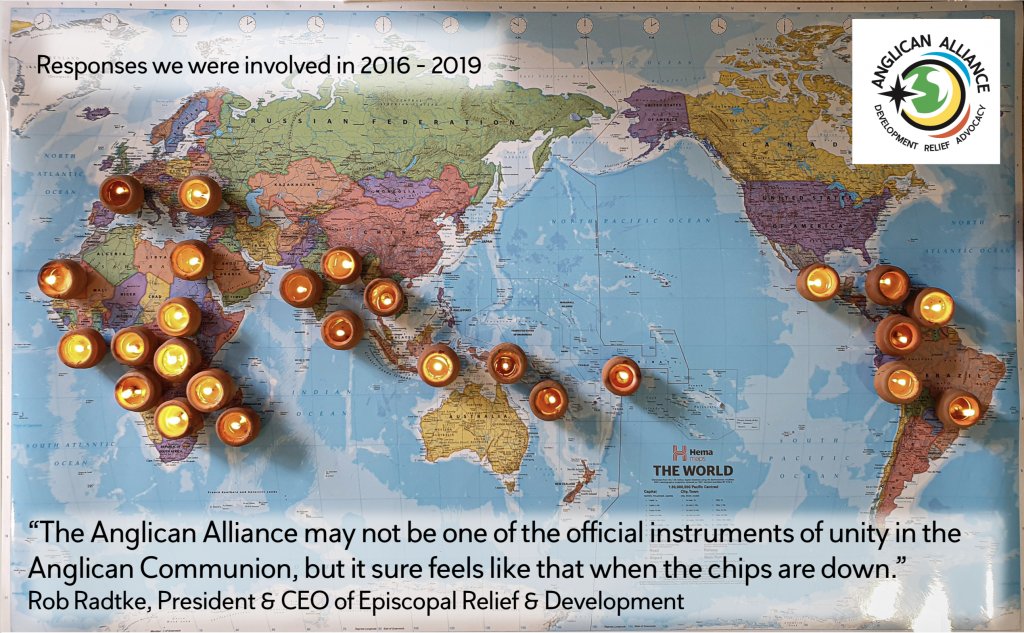WELCOME TO OUR CLIMATE EMERGENCY INFORMATION AND RESOURCE CENTRE
“It is our sacred duty to protect the planet, as well as our neighbours around the world who are on the front line of climate change”
Justin Welby, Archbishop of Canterbury
“Strive to safeguard the integrity of creation, and sustain and renew the life of the earth” – the fifth Anglican mark of mission

Facing an uncertain future
We are facing a climate and ecological crisis. Extreme weather events, sea level rise and changed rainfall patterns are severely impacting millions of people across the world. Climate change is wreaking havoc on the biodiversity of our common home, threatening the integrity of creation.
Across the Communion, Anglicans are on the front line of the climate emergency. They are not only affected by the impacts of climate change but are also taking action to respond to its challenges.
This page is a gateway to a host of information and resources about climate change – and wider environmental concerns – and how Anglicans across the world are engaged. See below for links and to the right for resources that can be downloaded.
And here it is in a nutshell! This short video explores the questions: How are people across the world being impacted by the climate and ecological emergencies? How are Anglicans across the Communion responding? And how might we all strive to safeguard the integrity of creation and sustain and renew the life of the earth – the fifth Anglican Mark of Mission?
The science of climate change
Click here for a page of useful links to information about climate change, fact-checking sites and examples of Christian scientists talking and writing about climate change.
Impacts of climate change
Stories of how climate change is affecting people in different parts of the Communion can be found here: Impacts of Climate Change Across the Communion.
These stories also appeared in the International Anglican Family Network’s newsletter of March 2020. You can download the newsletter from the resources section on the right.
The global response to climate change: the UNFCCC
Click here for information about the United Nations Framework Convention on Climate Change and the historic Paris Agreement. The most recent global gathering was was held in Madrid, Spain in December 2019. Several Anglicans were at the conference: Anglican voices at COP25.
Anglican Responses to climate change
- For examples of local responses to climate change across the Communion, click here.
- For examples of connecting and sharing best practice across the Communion, click here.
- For examples of Communion-wide responses, click here.
- See also this video conversation about faith and science: How is the Church engaging with science in responding to environmental issues?
The Church and its members are an integral part of local communities. The Church is present…
…before disasters hit during disasters, building community cohesion and resilience
…during disasters, providing emergency relief
…and afterwards, helping with long-term recovery.
Anglicans are engaged in mitigation and adaptation initiatives; the Church preaches and teaches about creation care; it shares best practice and training to build community resilience, especially through the Pastors and Disasters toolkit. In addition, the Anglican Communion has an active Environmental Network, has proactive “eco-bishops” across the Communion, engages with the United Nations on environmental and climate change concerns, and has made numerous statements about protecting our common home (here and here). Indeed, the Communion sees creation care as a central tenet of its mission, expressed in the fifth Anglican mark of mission: to strive to safeguard the integrity of creation, and sustain and renew the life of the earth.
Water is the primary means by which climate change is experienced by millions of people across the world: whether through rising sea levels (leading to salination of soil, crop loss and land loss), stronger and more frequent storms, flooding or drought. This short reflective video captures some of these impacts but also how churches across the world are responding.
Resources
Click here for a host of helpful resources from around the Communion and beyond.
2020: the year of climate action that wasn’t
Before the COVID-19 pandemic changed the face of our world, 2020 was set to be a critical year for the world to take action on climate change and protect the integrity of creation. There were due to be two key opportunities for Anglicans to engage and take action, the Lambeth Conference in July and the UNFCCC meeting – COP26 – in November. Both have had to be postponed, the Lambeth Conference to 2022 and the COP to November 2021. However, the climate and ecological crises have not gone away and still require urgent action; they can be seen as the deeper emergencies.
As with the COVID-19 pandemic, everyone in the world is facing the storm of climate change and is being (or will be) affected. But, as with COVID, people are not affected equally, with the already-disadvantaged facing the worst impacts and lacking the financial resources to weather the storm. However, the COVID-19 pandemic has also shown us possibilities, not least that when the world genuinely recognises it is facing an emergency, it takes action… and whether that action is protective and effective is deeply dependent on the calibre of the leadership.
We have seen how this new crisis of the pandemic has reshaped our world; the climate and ecological crises are just as real and require a response that matches the best of the responses we have seen to the pandemic.
The Archbishop of Canterbury Justin Welby has written: “Climate Change is the greatest challenge that we and future generations face. When we look at Jesus, we see one who instinctively stood alongside the most vulnerable in society. It is absolutely clear that following Jesus must include standing alongside those that are on the frontline of this unfolding catastrophe”.
Wherever we are in the Communion, may we – as intentional disciples of Jesus Christ – commit ourselves anew “to strive to safeguard the integrity of creation, and sustain and renew the life of the earth”.
Why does the Anglican Alliance care about climate change?
The Anglican Alliance connects, equips and inspires the worldwide Anglican family to work for a world free of poverty and injustice and to safeguard creation. Climate change is a major factor driving poverty and migration, as well as having wider severe detrimental impacts on the environment.
The Anglican Alliance also provides a convening platform for Anglican churches and agencies to work together in the aftermath of disasters, many of which are climate related. Helping build resilience to disasters and building partnerships for response and resilience is an increasingly important part of our work. See here.
Climate change is therefore a cross-cutting issue that is part of each of our three pillars of relief, development and advocacy.

